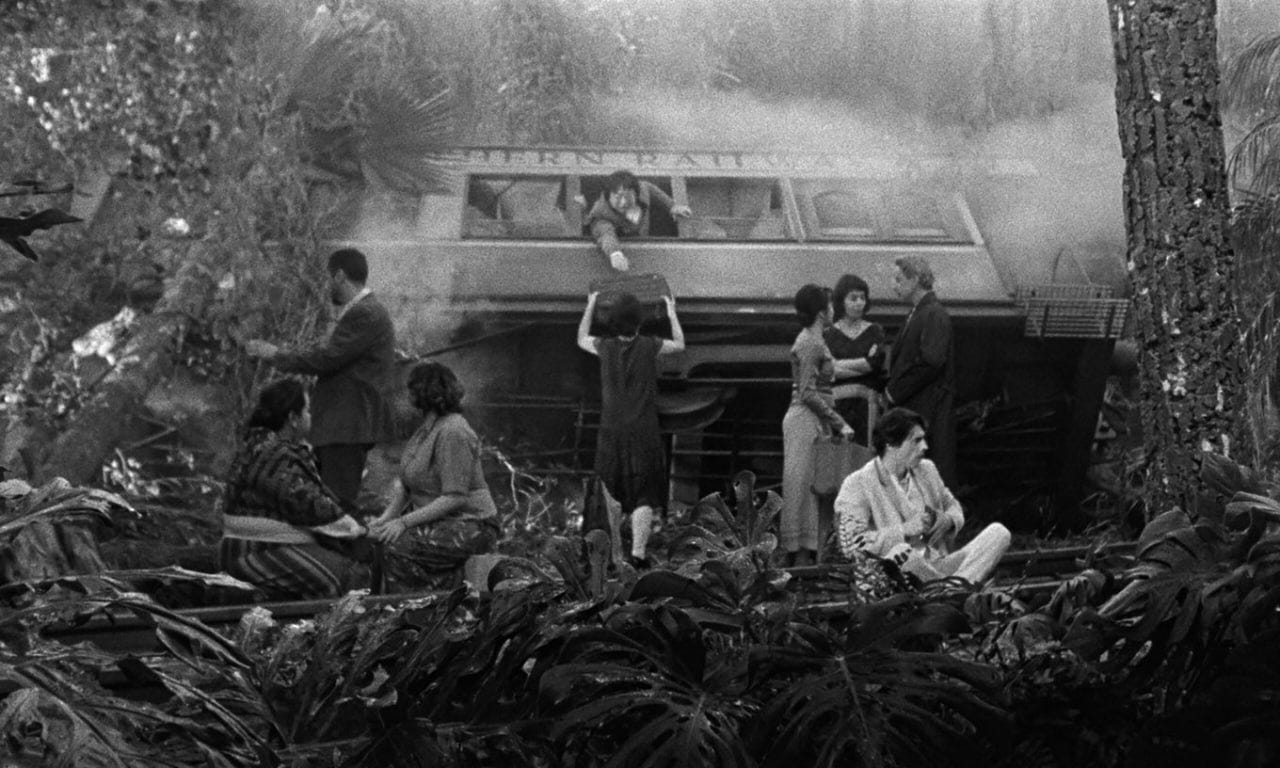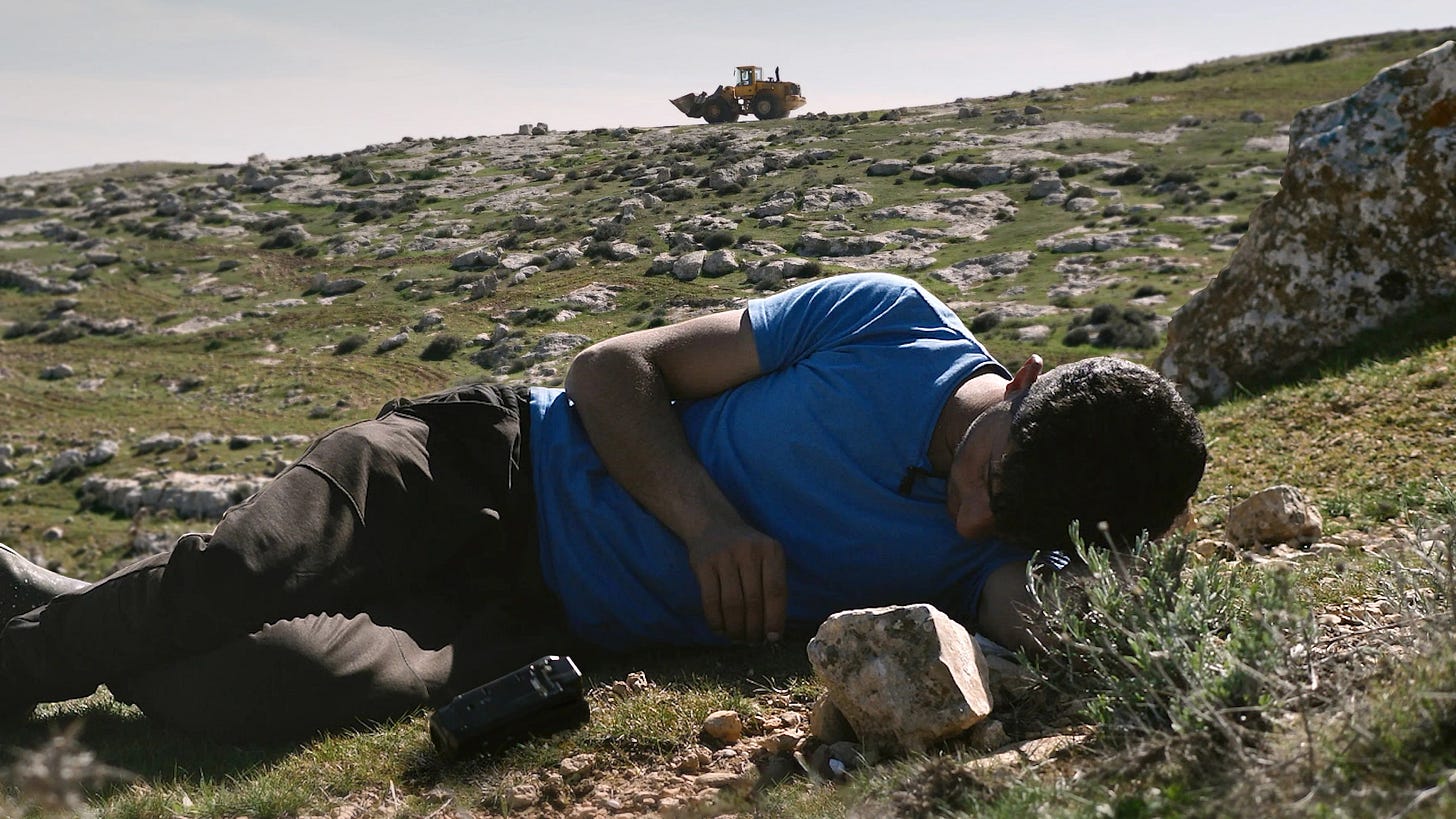TIFF Round-Up 🎥 Part 1
As TIFF comes to a close, In The Mood's contributors share the highlights and letdowns of this year’s festival
In The Mood’s editors decided to take the year off from TIFF, so they asked some of the magazine’s regular contributors (and a staff member!) to pick up on their slack. Below are some of their unfiltered thoughts, observations, and opinions on the city’s big film fortnight—and here’s part two 👀
Quinn Henderson
It’s easy to experience deja vú at TIFF. You run into the same people; you see the same dozen pre-show ads until the Varda jingle is permanently burrowed into your hippocampus; and all the movies with vague loglines and even vaguer titles slowly bleed into one. Here are all the different types of deja vú I experienced this year.
Recurrence: Last year, I went to see Jean-Luc Godard’s final film. This year I once again went to see Jean-Luc Godard’s final film. I was even seated beside the same person both times. Next year, it’s possible I’ll relive this experience again. You see, in the time leading up to his assisted suicide in September 2022, the French master was surprisingly prolific, working with a team of assistants to draft short films that were realized and released following his death. His latest final film Scénarios is very much like last year’s Phony Wars. It’s essentially a scrapbook slideshow documenting images, quotes, clips, and musings Godard had collected in his mind palace over the years. It was fascinating, but what I found more illuminating was the short that followed: a documentary showing a near-death Godard communicating his vision for the film to his assistants. It’s hard to watch at times as a clearly tired Godard struggles to elucidate much of anything and needs help working a photocopier. That said, nothing else this festival gave me more pleasure than hearing Godard sputter out in his inimitable gravel voice the phrases “le Fake News” and “un film de Russ Meyer.”
Repetition: I found myself saying “I grew up in a small town just outside of Winnipeg” ad nauseam. This is because I was introducing myself to a lot of people, but also because the province I lived most of my life in was having a moment, with seven Manitoban films playing this year. Winnipeggers were responsible for two of my faves of the fest. Rumours—the latest collaboration from Guy Maddin and the Johnson Brothers—received a chilly reception from many, but I found it to be riotous. Maddin has always been a slyly political filmmaker, from the oblique criticisms of capitalism in Saddest Music in the World or the highlighting of Orientalist xenophobia in his Dracula adaptation. Here, he does overt political satire of neoliberal ineffectiveness, showing a bumbling group of G7 leaders literally lost in the woods The political caricatures are not novel, or even that clever frankly—be it Cate Blanchett’s Teutonic German technocrat or Charles Dance’s doddering old U.S. prez—but are very funny and cannily portrayed. The standout being Roy Dupuis as a fuccboi Justin Trudeau surrogate. Better still was Matthew Rankin’s Universal Language: a gentle, melancholic, Kiarastomi-by-way-of-the-Red-River fable. Set in an alternate universe version of Winnipeg where Canada’s official languages are French and Farsi. I was flooded with emotions watching it. The touching tribute to Louis Riel, the many signs for Farsi-fied Winnipeg staples like Old Dutch chips and Salisbury House, and the crunching sound of winter boots trekking across hard-packed icy snow all left me verklempt.
Re-evaluation: One of my most memorable moviegoing experiences was seeing Joshua Oppenheimer’s documentary about the Indonesian genocide, The Act of Killing, when I was 17 at the Gimli Film Festival. Never before had I been so aware of the collective unease of an audience. By the end, after war criminal Anwar Congo was done retching, you could hear a pin drop in the theatre. I’ve not re-watched it since, but the movie floored me at the time and I remember my mouth was frequently agape. My mouth was also agape for much of The End, Oppenheimer’s debut fiction film, but for different reasons. His grandiose musical about a rich family living in a bunker in a post-climate apocalypse world is a spectacular misfire—a total discord between form and content. Perhaps a good version of a Pasek-and-Paul-style climate apocalypse musical could exist. I can’t imagine what it would possibly look like, but at the very least it would have some good songs. A claim that The End cannot make.
Quinn Henderson is a writer based in Toronto.
Winnie Wang
This year, I entered my festival experience with two objectives: to impress Wavelengths curator Andréa Picard with my sartorial choices and to fulfill my coverage responsibilities for Documentary Magazine.
On Thursday morning, I attended a 9:40 A.M. press screening of Nicolás Pereda’s Lazaro at Night, a playful and meditative study of three friends enmeshed in a love triangle while competing for a coveted role in a film. Strictly speaking, the film isn’t a documentary, but I’m a great admirer of the capaciousness of the term “nonfiction,” which captures Pereda’s infusion of autobiographical elements from his actors into his characters who share the same names and professions.
Later that afternoon, I watched Basel Adra, Hamdan Ballal, Yuval Abraham, and Rachel Szor’s No Other Land—a devastating film that moved me to tears with its sheer existence—and Raoul Peck’s Ernest Cole: Lost and Found—fascinating and poetic, though leaves much to be desired in terms of presentation and form—before embarking on a screening of Miguel Gomes’ Grand Tour. Edward, a Portuguese-speaking British diplomat, is our slippery guide as he traverses across Asia to evade his determined fiancée Molly in this 20th-century expedition. Intercut with documentary-style shots of present-day landscapes, the film serves as a sort of travelogue, skillfully shifting between temporalities, geographies, and generic categories. I’m not sure Gomes critically engages with coloniality enough, with his beautifully exotic and submissive characters as his protagonist towers over them in a three-piece suit, but I admit that the film is ambitious, artistically challenging, and deserving of its Best Director Award at Cannes.
To conclude the evening, E.J. Kneifel and I attended the premiere of Durga Chew-Bose’s directorial debut Bonjour Tristesse (my first entirely fiction film that day). The film is slick, expressive, and clearly exhibits the instincts that animate in her essay collection Too Much and Not the Mood. Certain shots almost feel more literary than cinematic, leaping off the screen with nostalgia and unspoken detail.
At the end of the first weekend, I realized both my goals. A vintage navy blazer overlaid on a crisp cotton blouse paired with A.P.C. trousers earned me an unexpected compliment on Saturday. By Sunday, I had seen another two feature films with the possibility of inclusion in my festival report, Sofia Bohdanowicz’s Measures for a Funeral and Wang Bing’s Youth (Homecoming). The former, the latest entry to the Audrey Benac Cinematic Universe, was a stirring exploration of the ways that sound can reverberate across time to resurrect and haunt, while the latter was a surprisingly delightful portrait of garment workers that eases up with New Year celebrations and weddings after several hours of oppressive factory fluorescent lights from its two prequels.
The secret to a successful festival experience is having a covert mission or two in your pocket, something that compels you to act, dress, live in ways that disrupt your natural rhythms. I felt more attentive to the ways that reality and myth merge, stretched the boundaries of documentary traditions in my mind, and found myself reaching for items in my wardrobe that were exclusively reserved for special occasions. Next year, I’m thinking of searching for the most delectable party appetizer, or starting a ridiculous rumour about myself, or finally catching a reasonable amount of sleep.
Winnie Wang is a writer and knitter based in Toronto.
Will Sloan
TIFF was founded 49 years ago by three businessmen who wanted to attract as many international movie people to Toronto as they could. Their strategy was to show as many movies as possible, and hopefully attract as many powerful and famous people as possible. Then and now, TIFF’s identity, such as it is, is that it offers an enormous buffet that you can build whatever kind of festival you want out of. But TIFF has always strived for more, and in more recent years has attempted to brand itself as the most socially conscious of the major film festivals. A festival known for its “demonstrated social impact initiatives,” to quote one press release. An institution that names its bar after Agnes Varda. Who was a woman.
So how do TIFF’s identities hold up in this troubled moment? Firstly, the 2024 festival brought a lot of movies and a lot of powerful and famous people. Mission accomplished on that front.
As for the other identity, the land acknowledgements that began every screening were frankly a little hard to take this year, given that one of the major corporate sponsors was RBC, with its investments in pipeline projects and Israeli weapons contractors. This is not an observation that’s original to me, of course. Anti-genocide protestors disrupted TIFF’s opening-night gala to demand TIFF dump the bank’s sponsorship, and clips circulated online of the grotesque audience booing them—god forbid their screening of a Ben Stiller movie start five minutes later. I’m sure a lot of people in the room would have no trouble articulating what films like Shoah and Killers of the Flower Moon say about the webs of complicity and indifference that surround genocide.
In short, TIFF’s social-justice pretenses chafed a little awkwardly this year with its neutrality on the Gaza genocide. The festival played Palestinian films (No Other Land, To a Land Unknown) and Israeli films (Bliss), so took criticism and protest from all sides. Radheyan Simonpillai reports in The Guardian that Alex Gibney faced a hostile, largely pro-Israel audience at the premiere of his Benjamin Netanyahu exposé The Bibi Files. Messages of solidarity for Palestine tended to be delivered in the smaller and lower-profile screenings, like the Wavelengths series (always a welcome balm at this festival). Meanwhile, another global conflict entered the chat when no less than Chrystia Freeland condemned TIFF’s screening of Russians at War, a Canadian-French documentary discussed by some as not being sufficiently supportive of Ukraine in the present war. For what it’s worth, I think it’s shameful that Freeland and others successfully pressured a film festival to pause their screenings of the documentary, and it’s also morally abhorrent that TIFF programmed a state-sponsored Israeli film during the country’s genocide of Palestinians. Is there any contradiction in my position? I don’t think so. Here’s a thought experiment: imagine it’s 1986 and a film festival receives two movies. One is a coolly dispassionate Canadian documentary that follows South Africa’s most virulent racist politicians in the waning days of apartheid. The other is an apolitical, middlebrow drama funded by South Africa’s apartheid government. I believe it’s a no-brainer that programming the former film is within the bounds of a film festival’s mandate, while programming the latter film is a moral travesty.
Most of us who aren’t named Biden, Harris, or Netanyahu are powerless to do much right now, but I also wonder: how hard would it have been for some programmers to just skip right past the name “RBC” when doing their intros? What’s the worst that could happen—they get fired in a way that causes a big PR headache for TIFF? But hey, lest I sound too self-righteous, I’m no saint either. What am I doing to help? I’m just here watching movies. One of the best I saw was a short in the Wavelengths program called Being John Smith, an autobiographical piece by a venerable British experimental filmmaker unlucky enough to have the name “John Smith.” Partway through, his wryly funny narration is interrupted by starkly serious subtitles in which he admits that it’s hard for him to focus on his work right now, given the genocide in the Middle East. I was relieved to see Smith express this thought so clearly, because I’ve felt a version of it whenever I’ve worked on a project this past year. What’s the point of anything?
Will Sloan is a writer, podcast mogul, and folk hero.
TIFF Round-Up 🎥 Part 2
We couldn’t fit all of our feelings about TIFF into one newsletter, so below is part two of our contributors’ unfiltered thoughts, observations, and opinions on the city’s film fortnight 🍿
In the mood for something more?
Dive into the juicy archives of our newsletter and our online magazine.
Wondering what to watch?
Choose a mood on our Film Recommendation Generator and get a curated pick from writers, filmmakers, and poets.
Support us!
If you’d like to donate to our mag, here’s our PayPal! We’re volunteer-run, and donations go directly to our contributor honorariums and operating costs.












